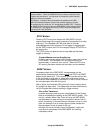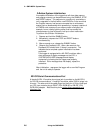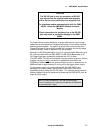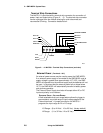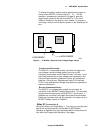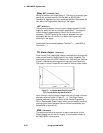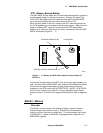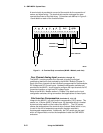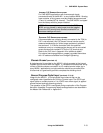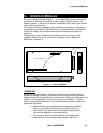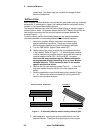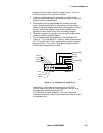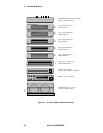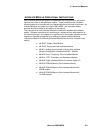
2... OMP-MODL System Base
Using the OMP-MODL
2-13
INTERNAL CJC SENSING APPLICATIONS:
For OMP-MODL applications with thermocouple inputs
connected directly to the MLAD-1 or any installed MLIM-1 Analog
Input modules, a wire jumper must be installed across terminals
13 and 14 (marked INT for internal). The OMP-MODL is shipped
from the factory with this jumper installed.
NOTE: If thermocouples are connected to the OMP-
MODL on any channel, a wire jumper must be installed
across the CJC terminal strip terminals marked INT or
erroneous readings will occur..
EXTERNAL CJC SENSING APPLICATIONS:
If thermocouples are not being directly connected to the TSA (ie
CJC is not required), this CJC sensor channel can be used to
measure temperatures (or limited range resistance) outside of
the enclosure. A 10 Kohm thermistor (with the specified
resistance curve) or a resistance type sensor can be connected
across the terminals marked EXT on the CJC terminal strip.
Refer to the CJC Icon in Appendix A for additional details.
For external sensing applications, copper lug potted thermistors
with 10’ leads are available from Omega Engineering.
Chassis Ground (terminals 16)
A single terminal is provided on the MLAD-1 which connects to the internal
Chassis Ground circuit within the logger. In installations where sensor wiring
utilizes a Shield conductor connection to I/O module terminal strips (eg in
many MLIM-1 applications) a single conductor should be connected from
this terminal to a good earth ground to complete the shielding circuit.
General Purpose Digital Input (terminals 17 & 18)
Integral to the MLAD-1 is a single digital input channel that can be
configured under HyperNet as an Event or Counter input. The GPDI input
signal (either a contact closure or 0 to 15VDC max driven signal) is applied
across the two terminals observing polarity.
The operation of the GPDI is configured during construction of the Program
Net within HyperNet. Programming details and applications are described in
the Master Icon Reference in Appendix A.



